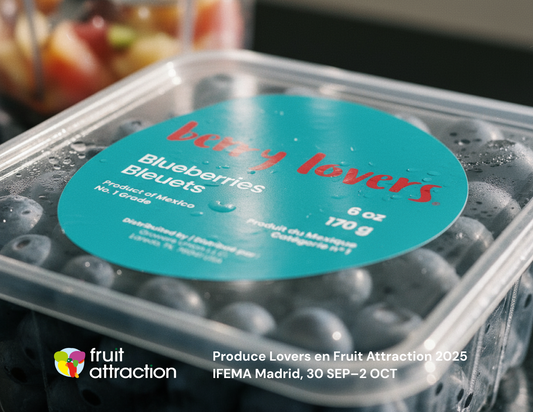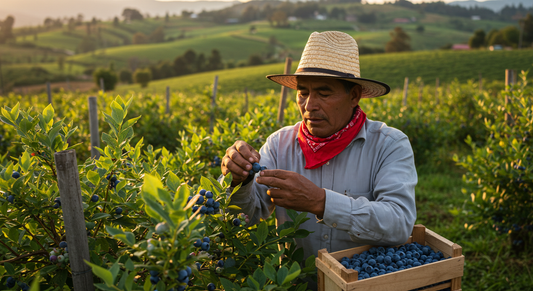
Understanding Shelf Life and Post-Harvest Behavior of Mexican Berries
Share
Mexico stands out as a top origin for fresh berries thanks to its proximity, extended season, and premium agronomic conditions. Here's why North American buyers are turning to Mexico as a strategic sourcing partner.
Faster Transit = Longer Shelf Life
One of the most significant sourcing advantages Mexico offers is its geographical proximity to the U.S. and Canada. Compared to South American origins such as Peru and Chile, Mexico reduces transit times by more than 60% in many cases.
According to logistics data from the USDA and industry reports:
- Mexico to U.S./Canada: 1–4 days by truck
-
Peru to North America: 10–14 days by sea
(Source: USDA FAS Peru Blueberry Annual Report, 2023) -
Chile to North America: 14–21 days by sea
(Source: ProChile, Chile Fruit Export Reports)
This shorter transit window enables importers to receive fresher berries with maximum postharvest shelf life, minimizing shrink and unlocking better retail performance.
Reliable Year-Round Programs
Thanks to Mexico’s diverse altitudes and microclimates, berry production can occur from September through June, filling seasonal gaps from other regions. Peak volumes are typically available between February and May, offering a solid alternative when Chile and Peru are off-season.
This wide availability enables program-based sourcing strategies, securing continuity for retailers and foodservice buyers with fixed weekly volumes.
Superior Agronomic Conditions
Mexico’s highland growing regions—including Jalisco, Michoacán, Guanajuato, and San Luis Potosí—provide optimal natural conditions: high solar radiation, long daylight hours, volcanic soils, and mild temperature fluctuations. These factors contribute to berries that are:
- More structurally resilient during shipping
- Sweeter and firmer, with lower exudation
- Better suited for long shelf life and visual impact
Research from the UC Davis Postharvest Center confirms that cooler growing regions correlate with higher sugar concentration and better shelf performance in small fruit crops like blueberries and strawberries.
Export-Ready Infrastructure
Mexican exporters operate modern facilities that comply with international certifications. At Berry Lovers, we follow strict postharvest protocols and are fully certified under GlobalG.A.P. and PrimusGFS.
This infrastructure ensures:
- Cold chain integrity from field to delivery
- Advanced grading, sorting, and packing
- Traceability and food safety compliance
Flexible Supply Solutions
Mexico’s proximity allows for more responsive and flexible programs. At Berry Lovers, we offer 4 to 6 shipments per week, allowing buyers to adjust volumes based on demand, reduce inventory holding, and improve rotation.
We also offer packaging options adapted to retail, foodservice, and processing formats, including clamshells, bulk boxes, and private label solutions.
Mexico vs. Other Origins: Key Comparison
| Factor | Mexico | Peru | Chile |
|---|---|---|---|
| Transit Time to U.S./Canada | 1–4 days (ground) | 10–14 days (sea) | 14–21 days (sea) |
| Production Season | Sep – Jun | Jun – Oct | Nov – Jan |
| Postharvest Shelf Life | High (low loss rates) | Moderate | Shorter |
| Proximity & Flexibility | High | Low | Low |
A Strategic Partner for North American Buyers
Mexico offers more than agricultural supply—it provides a strategic advantage for importers and retailers seeking efficiency, reliability, and quality. At Berry Lovers, our expertise, flexible programs, and proximity to market allow us to deliver consistency at scale.
📩 Contact our export team to request product availability, specs, or to explore a tailored sourcing program for your business.




